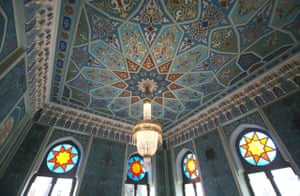Zurab Lomidze was director of the Tbilisi opera house at the time of Georgia’s 1991 civil war. As the fighting raged outside, along the capital’s Rustaveli avenue, he and other staff had stayed inside to try to protect it.
“One day a group of paramilitaries gunned down the front door, telling us they needed the opera for shelter,” he remembers. “After the gunmen left we had no front door and a wall riddled with bullets. When we opened again after the fighting, I wanted to cover that wall in glass and put up a big sign saying: ‘This is not how you treat culture’.”
Even before it was caught up in Georgia’s post-Soviet turmoil, Tbilisi’s opera house had been burnt to the ground – twice. Then it was almost brought to its knees as the money ran out. Now, a new era beckons for the 165-year-old home of Georgian opera and ballet: this weekend the theatre is reopening its doors, following a six-year, multimillion-pound refit paid for by the country’s richest man and former prime minister, Bidzina Ivanishvili.
“We hope it’s a moment of cultural rebirth for Georgia,” says Nina Ananiashvili, the director of Georgia’s State Ballet. “Culture is our face.” With just days to go before the grand opening, actors are conducting final dress rehearsals for the traditional season opener, Abesalom and Eteri.
Lomidze, now the opera’s technical director, has been overseeing preparations, among other things making sure all 800 lightbulbs in the giant 3.5-tonne chandelier hanging above the theatre hall have been replaced.
Georgia has a rich tradition of performance art dating back centuries, long before it was swallowed up by the Russian empire and then the Soviet Union. The opera house’s history is also entwined with its tortured relationship with its giant neighbour. It was built in the mid-19th century by the tsar’s pro-consul in the Caucasus as a kind of bribe, hoping to win restless Georgians over to Moscow’s rule. During communist rule, Tbilisi was established as one of the premier venues for opera and ballet outside Moscow.
But when the opera house reopened in the 1990s after the civil war, tickets had to be priced so cheap there was no money to pay staff. “It was really cold inside, but the demand was huge,” says Lomidze. “Maybe opera is a luxury, but in those years in Georgia it was more of a necessity.”
Although Georgia’s prospects have improved over the past decade, it has been a struggle to find the money for big performances and to maintain the neo-Moorish building. “It was in terrible shape by the time it closed,” says architect Leri Medzmariashvili, “but we have tried as much as possible to be faithful to the original look”.
Funding for the makeover has come from Ivanishvili, who has promised to pay for the first year’s performances on top of the 100m lari (£28m) renovation bill. Some have questioned Ivanishvili’s motives in funding this and many other big projects around the country, given the power he wields over domestic politics: prime minister for just under a year in 2012 and 2013, he founded the Georgian Dream party which is now the leading element in the ruling coalition.

The coalition faces elections in the autumn but Nikoloz Chkhetiani, chairman of Ivanishvili’s Cartu Fund charity, which oversaw the opera project, dismisses the complaints. “We didn’t plan to finish this renovation in election year,” he says.
It is not clear whether or not the money will keep flowing for the big opera and ballet stars Tbilisi wants to lure back. In recent years Georgian opera singers and dancers have had glittering careers abroad. Lado Ataneli and Tamar Iveri, who will perform the lead roles in Abesalom and Eteri this weekend, have sung many times at La Scala in Milan.
Ananiashvili, who herself won a reputation as one of the world’s greatest ballerinas for her performances with the Bolshoi in Moscow and other major ballets before returning to Tbilisi in 2004, hopes to bring some of that lustre back home. “So often when we say we’re from Georgia,” she says, “people think Georgia, USA”.
